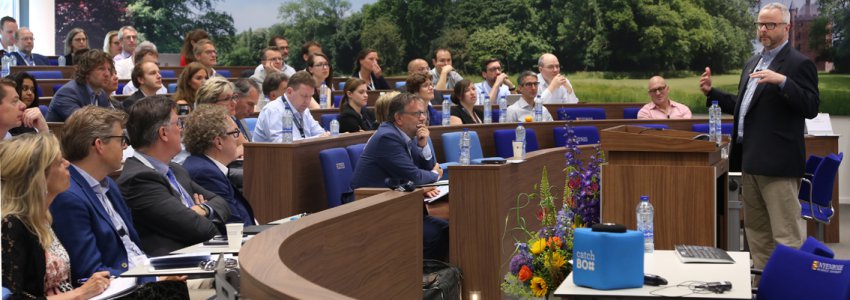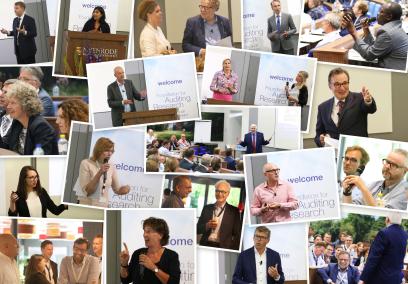Quality is theme at the 3rd Conference of the Foundation for Auditing Research
15 June 2018

Broader vision and deep knowledge stimulate vision on audit quality
Breukelen, 7 June 2018 – Different perspectives provide different insights about the audit profession. Understanding each other’s vision and everyone’s role in the entire financial reporting and assurance supply chain, finding a common language, and opening a dialogue about the working disciplines within the audit profession helps to stimulate quality. The exchange of knowledge and experience at the 3rd conference of the Foundation for AuditingResearch (FAR), held on 5 and 6 June at the Nyenrode Business University estate, supported this. That was one of the conclusions at the closing of the conference.

Under the heading “Moving the Audit Profession Forward – New Research and Best Practices” around 130 practitioners from the field and academics from universities in the Netherlands and abroad shared their knowledge and insights about the audit profession.
Quality definition
Professor Preeti Choudhary (University of Arizona, USA) as one of the first speakers posed the question on whose quality the discussion should focus, in the search for the factors that determine audit quality: should it be the quality of the auditee or that of the auditor? Choudhary used data that she obtained through the American counterpart of the AFM: the PCAOB. Her research showed that although auditors will carry out more adjustments as the internal controls of the company get worse, (small) misstatements will remain. Furthermore, she noted that the auditor was only able to carry out these adjustments if the managers of the audited company also recognized these misstatements as such. In her research she shows that for larger companies often stricter requirements are set in terms of permitted deviation between reported and actual figures: materiality. As soon as this is less the case, we see more and larger misstatements in the financial statements.
Learning capacity
In their presentation of the research findings on a learning culture in audit teams, Wim Gijselaers and Therese Grohnert of Maastricht University argued for a safe environment with room for reflection and feedback. The role of ‘gray hairs’ within the audit teams appears to be of great importance for audit quality. The experience built up by auditors in the age group of 40 to 60 increases the likelihood that knowledge will be applied and that procedures and rules will actually be followed. They also established that the use of experienced auditors gives a significant boost to the quality of the audit. Next to that, another interesting finding shows that a healthy learning climate has a positive effect on the retention of talent in auditing.
No ‘silver bullet’
In the panel discussion about quality between academics and practitioners, a recently published report by the Monitoring Committee Accountancy (MCA) was also debated. In the discussion about the scientifically identified factors that determine the quality of an audit, it appeared that the practitioners do not yet have an unequivocal answer. Or as one of the speakers aptly articulated: there is no ‘silver bullet’ to solve all issues. There is still a lot of research to be done.
Mark Peecher of the University of Illinois brought new scientific insights into the Fraud Detection theme. He showed that more experienced auditors who listen to so-called ‘earnings calls’ by management are able to detect fraud cues early on, purely based on the intonation that managers use during these calls. He himself qualified this research as the result of an unprecedented collaboration between science and practice.
Building bridges through communication
Provided science and practice do their best to speak a common language, both can learn a lot from each other. It enables academics to ask, as well as answer, better questions. In practice, one can take advantage of the insights from science. Here we can think of the importance of experience, which emerged twice as a quality-determining factor during the conference. Steven Salterio of Queen’s University, Canada, noted the following: “This FAR conference is the best example of how the interaction should be between science and practice.”
Bert Albers from Deloitte concluded the conference by reflecting on the discussions that took place during the conference. When he asked the practitioners in the room whether FAR was helping to improve the audit profession, a large majority raised their hand. Albers indicated that he himself, as a practitioner, was inspired and that he was confirmed in the choice of subjects he and his colleagues are currently focusing on in practice: “It is important that we keep this new relationship between science and practice flourishing, because I think we can actually make progress in our field.”
About the Foundation for Auditing Research
The Dutch Foundation for Auditing Research (FAR) was founded in 2015 based on the vision that the audit profession is subject to drastically changing expectations and requirements. FAR focuses on the further development of knowledge about audit and assurance quality and the sustainable improvement of the audit practice through fundamental scientific research, international collaboration with other research institutes, and by sharing research results through conferences and master classes. FAR links the audit science and practice by means of collaboration. This strengthens the learning curve of the audit profession and its stakeholders, feeds audit education, and offers ongoing support to the research community in the area of auditing, both within the Netherlands and abroad.
